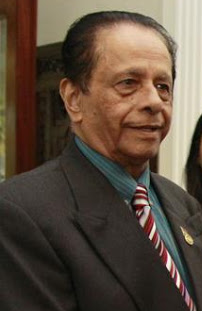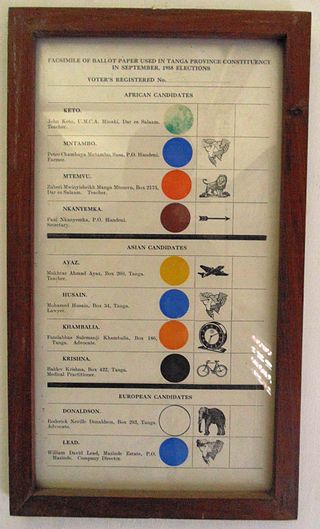
Parliamentary elections were held in Ghana on 29 December 1992, the first since 1979. Voter turnout was just 28.1% amidst a boycott by opposition parties, who had claimed the preceding presidential elections in November – won by former military ruler Jerry Rawlings with 58% of the vote – were fraudulent, with international observers considering them not to have been conducted in a free and fair manner.

Presidential elections were held in Gabon on 5 December 1993, the first time more than one candidate had contested a presidential election in the country. Incumbent President Omar Bongo, in power since 1967, sought a five-year term against twelve other candidates. According to official results Bongo won in the first round with 51.2% of the vote. However, the main opposition leader, Paul Mba Abessole, alleged fraud, claimed victory, and threatened to form a rival government. Riots in 1994 practically brought the country to a standstill until Bongo agreed to attend a peace conference with opposition groups in September 1994, in which a coalition government was formed until the 1996 parliamentary election, which Bongo's Gabonese Democratic Party won by a landslide.

General elections were held in Mauritius on 20 November 1995. The result was a landslide victory for the Labour Party-Mauritian Militant Movement alliance led by Navin Ramgoolam, which won all 60 constituency seats on Mauritius. Along with 1982, it was one of two elections in which a party won every seat. The Militant Socialist Movement (MSM) led by Anerood Jugnauth lost power after 13 years, with Jugnauth resigning two days after the results were announced. Navin Ramgoolam became Prime Minister and appointed Paul Berenger as Deputy Prime Minister.

General elections were held in Swaziland in June 1964 to elect members of the Legislative Council. The result was a victory for the Imbokodvo National Movement, which won eight of the directly-elected seats and all eight Tinkhundla seats.

General elections were held in Swaziland between 16 and 17 May 1972 to elect members of the House of Assembly. The result was a third successive victory for the royalist Imbokodvo National Movement, which won 78% of the vote and 21 of the 24 seats, based on a voter turnout of 74.0%. The Ngwane National Liberatory Congress won three seats, but five days after the election one of its successful candidates was served with a deportation order as an "undesirable alien". Although he subsequently won a High Court ruling against the order, in November the parliament created a tribunal through which his citizenship was revoked. The Appeal Court declared the act unconstitutional, and on 12 April 1973 the parliament passed a motion that "called on the king to devise ways and means of dealing with the crisis". The result was that King Sobhuza II suspended the constitution, dismissed Parliament, banned all political parties and became an absolute monarch.

General elections were held in Zambia on 5 December 1973. They were the first elections held since the country was formally declared a one-party state in August, with the United National Independence Party (UNIP) as the only legally permitted party. UNIP leader Kenneth Kaunda was automatically elected to a third five-year term as President, and was confirmed in office via a referendum in which 88.8% of voters approved his candidacy. UNIP also won all 125 seats in the National Assembly. Voter turnout was 39% of the 1,746,107 registered voters for the presidential election, and 33% for the National Assembly election.

General elections were held in Tanganyika in September 1958 and February 1959. Elections were held in five constituencies on 8 and 12 September 1958, and in the other five on 9 and 15 February 1959. The Tanganyika African National Union (TANU) and affiliated independents won all 30 elected seats in the Legislative Council.

General elections were held in Mauritius on 7 August 1967. Ethnic violence broke out in Port Louis between Muslims who were opposed against Creoles and Chinese. Anti-riot police used tear gas to restore peace.

General elections were held in Mauritius on 20 December 1976. They were the first general elections to be held since independence on 12 March 1968 and came nine years after the previous elections in 1967. Although elections had been scheduled for 1972, they were cancelled by the Labour–PMSD–CAM coalition government due to political unrest. The year prior to these elections was marked by the May 1975 Students protest riots.

General elections were held in Mauritius on 11 June 1982. 360 candidates representing 22 parties contested the election, the result of which was a landslide victory for the Mauritian Militant Movement–Mauritian Socialist Party alliance, which won all 60 of the directly elected mainland seats.

General elections were held in Mauritius on 30 August 1987. The result was a victory for the Alliance, composed of the Labour Party, the Mauritian Socialist Movement and the Mauritian Social Democrat Party, which won 44 of the 70 seats.

General elections were held in Kenya in February 1961. The result was a victory for the Kenya African National Union, which won 19 of the 53 elected seats.

General elections were held in Kenya on 14 October 1974. At the time, the country was a de facto one-party state with the Kenya African National Union being the sole party to participate in the election. 740 KANU candidates stood for the 158 National Assembly seats, with 88 incumbents defeated. Voter turnout was 56.5%. Although the post of President of Kenya was due to be elected at the same time as the National Assembly, Jomo Kenyatta was the sole candidate and was automatically elected without a vote being held. Following the election, a further 12 members were appointed by President Kenyatta.

General elections were held in Rwanda on 10 March 1965, the first direct one in the country and the first since independence in 1962. At the time, the country was a one-party state with MDR-Parmehutu as the sole legal party. Its leader, Grégoire Kayibanda, ran unopposed in the country's first election for President. Voter turnout was 87.6%.

General elections were held in Rwanda on 29 September 1969. At the time, the country was a one-party state with MDR-Parmehutu as the sole legal party. Its leader, Grégoire Kayibanda, ran unopposed in the presidential election. Voter turnout was 90.9%.

General elections were held in Senegal on 1 December 1963. It was the first time the President had been directly elected. However, incumbent Léopold Sédar Senghor of the Senegalese Progressive Union (UPS) was the only candidate, and was re-elected unopposed. The UPS also won all 80 seats in the National Assembly with 94.2% of the vote. Voter turnout was around 86% for the presidential election and 90% for the Assembly election.

General elections were held in Senegal on 28 January 1973 to elect a President and National Assembly. At the time the country was a one-party state, with the Senegalese Progressive Union (UPS) as the sole legal party, As a result, its leader, Léopold Sédar Senghor, was the only candidate in the presidential election and was re-elected unopposed. In the National Assembly election, voters were presented with a list of 100 UPS candidates to vote for. Voter turnout was 93.0% in the parliamentary elections and 97% in the presidential election.

Presidential elections were held in Egypt on 13 October 1981 following the assassination of President Anwar Sadat on 6 October. The vote took the form of a referendum on Mubarak's candidacy, with 98.5% of voters voting in favour. Voter turnout was reported to be 81.1%.

Presidential elections were held in the United Arab Republic on 15 March 1965. The election took the form of a referendum on the candidacy of Gamal Abdel Nasser, who ran unopposed. He won with almost seven million votes, and only 65 against. Voter turnout was 98.5%.

General Council elections were held in French Cameroons on 22 December 1946.
















